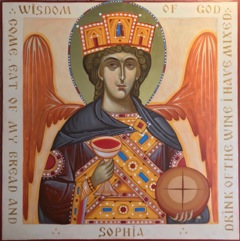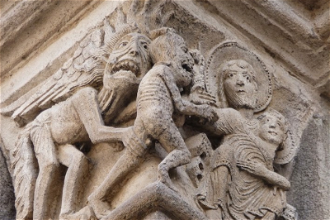Reflection and Poem on the O Antiphons - O Sapientia

Icon by Fr Dobromir Dimitrov, published with permission
We do not know the real date when those seven Magnificat 'O'antiphons were first used at Vespers (Evening Prayer) in the last week of Advent by the Latin Rite of the Church. That they may go back as far as the 6th century can be attested to by a comment made by Boethius, we know by the Middle Ages there was a tradition of these antiphons being sung with great solemnity, often following the custom of that found in the Benedictine Abbey of Fleury-sur-Loire, where each antiphon was intoned in order of precedence by an office holder in the community, beginning with the Abbot and continuing with officials who had some link to the theme of the antiphon-such as the Cellarer (O Clavis, key keeper) and the monastic gardener (O Radix). After Vespers some form of gift was distributed by the person concerned, usually in the form of some good wine at supper.
Whatever the historical development, this last week before the feasts of the Nativity and its 'O' antiphons have had a profound effect on the spirituality of Advent itself, for each one of them refers to the prophecy of Christ as Messiah, found in the prophetic utterances of Isaiah.
O Sapientia, on December 17th, is the only one of them to refer to Christ in directly feminine terms, for Wisdom is always 'she'! Here we see a valuable tradition that takes the Risen Lord out of purely patriarchal male imagery and widens our theological and spiritual vision to help us understand him in the context of a more a more prudently comprehensive Christian tradition, that has ever been present but often ignored and one which now needs articulating strongly!
This antiphon, taking us deep into the Wisdom literature of the Scriptures, also hints at the New Testament fulfilment of God's Wisdom found in Saint John's Gospel, where Christ is seen as Logos, Word. For us all it is a timely reminder that God is neither male nor female, that in the Risen Christ we see the sundering of types and divisions enabling us to transcend our own petty notions about points of difference and in God's Wisdom begin to see a greater whole, which will also be ours, when we will be united in Christ.
Poem, Christ our Wisdom
O Sapientia, quae ex ore Altissimi prodiisti, attingens a fine usque ad finem, fortiter suaviterque disponens omnia: veni ad docendum nos viam prudentiae.
O Wisdom, Who came out of the mouth of the Most High, reaching from end to end, resolutely and sweetly ordering all things: come and teach us the way of prudence.
In the void, before all beginnings, when only was God,
A darkness mightier than the light came into flame.
It blew, as breath must from that mouth of the Highest One
A breath so sweet as then it honeyed creations' stars
And warmed the love that God was showing
In the Word and Spirit blowing.
God thought:
'Is this a void?' Then wisdom spoke:
'Not this, it is a darling night, a spreading horizon,
It is good, so good'.
'Let it be so!' said God, 'let it be so!'
And so it was, for She, Wisdom is the Christ to come,
Who though in Word and Flesh descended,
Still now is wanted in the haunts of humankind!
For we hesitate before the light,
Fear the understanding and the truth,
And yet we yearn for Her,
Agia Sophia,
Christ our Mother and our teacher!
(The Icon was written by Father Dobromir Dimitrov, a Bulgarian Orthodox Priest, academic and iconographer living and working now in Kent.)


















